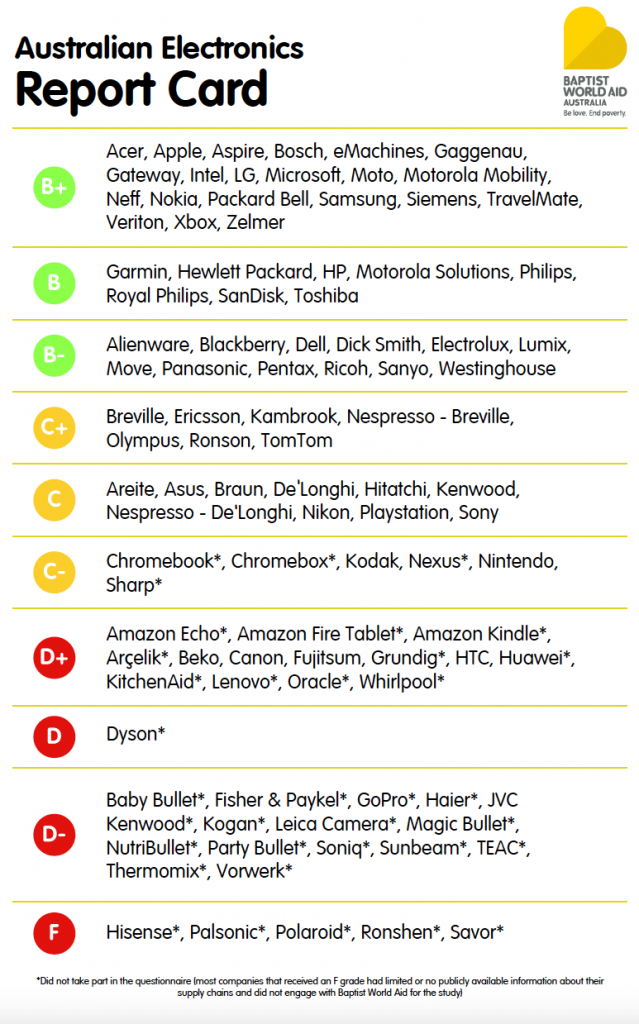Consumers looking to buy a new gadget have been urged to ensure they don’t inadvertently support modern slavery.
More than 50 electronics companies failed to make the grade on forced labour, child labour and exploitation in the 2016 Electronics Industry Trends report released today by Baptist World Aid.
The culmination of two years of research, the report finds that the electronics industry still has a long way to go in taking steps to protect workers across its supply chain.
While 64 per cent of companies had shown some improvement since the first report in 2014, none had improved significantly to gain an A grade. The median grade was C-.
“That’s concerning because these are the biggest and most profitable companies in the world and there’s a lot more they need to do to ensure that workers are protected from exploitation, child labour and forced labour,” said Gershon Nimbalker, Advocacy Manager at Baptist World Aid Australia, an organisation with a long history of international social justice campaigning.
Mr Nimbalker said traceability and visibility in the supply chain was a prime concern.
 “No company had traced where its raw materials were coming from all the way back to the mines, which is where we know the most egregious abuses of workers rights are,” he said.
“No company had traced where its raw materials were coming from all the way back to the mines, which is where we know the most egregious abuses of workers rights are,” he said.
“Even in last 12 months we’ve seen reports that have highlighted the use of children working in some terrible conditions in mines that feed into the electronics industry.
“In Indonesia, a BBC report showed children working in tin mines in circumstances where collapses were common and fatalities have occurred.
“In the last two weeks Amnesty released a report on cobalt mining in the Democratic Republic of Congo where children are engaged in what the ILO describes as the worst form of child labour in hazardous conditions, down dark mines and exposing themselves to enormous health risks.”
Mr Nimalker called on consumers to “vote with their wallets” and check the credentials of a consumer brand “to ensure the products we buy aren’t fuelling this injustice”.
“As Christians I think we should be particularly concerned about this. We serve a God of justice who wants all people to enjoy the goodness and abundance of the world that he’s created and to be able to live with dignity because we carry his divine image,” he said.
“I think we should be using reports like this one to preference the companies that are doing more to protect workers. Also we should be calling on our favourite companies to take the extra steps that are needed to minimise the risk of forced labour, child labour and exploitation through the entire supply chain.”
The second Electronics Industry Trends report used publicly available data and a questionnaire to grade the 56 companies from A to F on their labour rights management systems across three keys stages of the supply chain: extraction of raw materials, smelting/refining or components manufacturing, and final manufacturing.
The strongest performers included many of the world’s most valuable companies. Apple, Microsoft, Samsung, intel and LG all received a B+.
“The fact that Apple, one of the most proactive companies in managing its supply chain risks, has still been targeted for excessive working hours in its Chinese factories and the use of extremely hazardous child labour in its mining processes, demonstrates how much more needs to be done,” the report says.
The report singles out electronics retailer Dick Smith, which is now in administration, for demonstrating that some of its factories in China were paying wages significantly above the minimum. It had improved its performance from D to B-.
GPS brand Garmin was the only other company to demonstrate measures to lift poverty-level wages, lifting its grade from C to B. Appliance brands Thermomix and NutriBullet along with action camera brand GoPro were among the worst performing at D-.
One of the research’s most troubling findings of was that no company had implemented a living wage in its supply chain.
Multinational Garmin gained a partial score for demonstrating that the final stage of its manufacturing took place in Taiwan, where workers were paid above the minimum wage.
One hopeful sign was that 55 per cent of companies, up from 31 per cent in 2014, had explicitly included the right to collective bargaining in their code of conduct.
Unfortunately, only 7 per cent of companies could demonstrate facilities with collective bargaining agreements in place.
The report urges companies to take action to improve worker wages through collective bargaining and advocating for higher minimum wages to help their workers lift their families out of poverty.
Email This Story
Why not send this to a friend?


